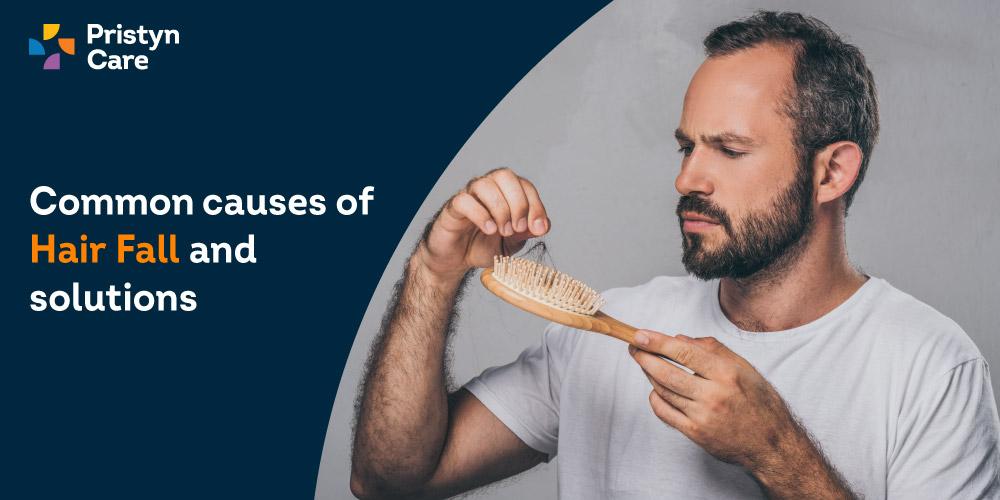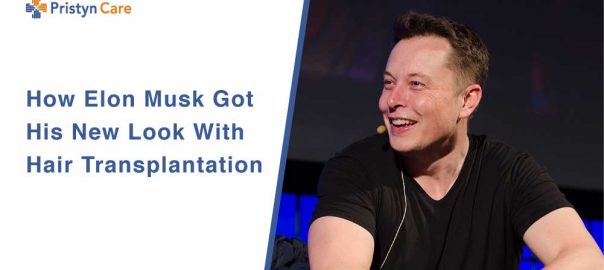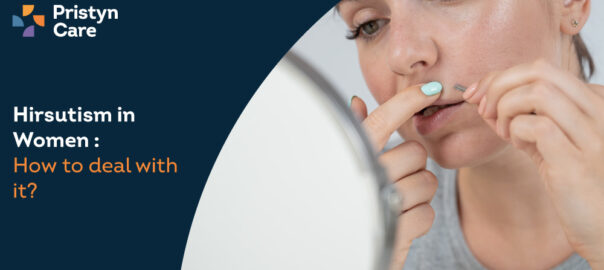![]() Views: 1,430
Views: 1,430
8 Common Causes of Hairfall & Their Solutions
An average human has around 5 million hair follicles all over the body, and approximately 1,00,000 of them are supposed to be on the scalp. The number can even go up to 1,50,000 or more for some individuals.
Dedicated Support at Every Step!
Our Doctors are available 24 hours a day, 7 days a week to help you!
However, humans shed around 50 to 150 strands of hair every day. You may panic about finding a substantial number of hair strands on the pillow, but it is not a sign of a serious hair fall problem. Scientists and dermatologists reassure that losing even around 150 hair strands is normal, and some people may even shed around 200 hairs due to dietary routines or other factors.
While losing some hair every day is normal, excessive hair shedding can be distressing and lead to self-esteem issues. Understanding the underlying causes of hairfall is crucial in order to find effective solutions and regain control over your hair health.
In this blog, we are going to discuss the most common causes of hair fall and what you can do about them. But before we get to the causes, let’s understand the condition.
Table of Contents
What is Hair Fall?
Also called hair loss, alopecia, or baldness, hair fall is the loss of hair from the head or body. Typically, the head is involved, but in some cases, the entire body experiences hair loss or thinning. This can be very bothersome for both men and women physically and psychologically.
Globally, around 35 million men and 21 million women suffer due to hair loss issues. In some cases, hair loss occurs as a side effect of an underlying condition, whereas in other cases, it may occur due to lifestyle factors, genetic factors, environmental factors, etc. Generally, people are unaware of the factors that impact hair growth and often cause hair fall issues. So, here, we will learn about the common causes of hair fall in depth.
No Cost EMI, Hassle-free Insurance Approval
Common Causes of Hairfall & What To Do About Them
Hair fall and thinning affect 9 out of 10 Indians, and it is often demoralizing for people. There can be different reasons behind hair loss, from vitamin deficiency to a chronic underlying autoimmune disease. The good thing is that in most cases, hair fall can be treated, and the treatment method may vary depending on the cause.
Here we are listing some primary causes of why you might be experiencing hair fall problems, along with what you can do about them.
Cause 1: Hormonal Imbalance & Genetics
Commonly termed male or female pattern baldness, androgenetic alopecia is the most common cause of hair fall, which is genetic and often triggered by the male hormone androgen. In females, the excess androgen levels make the hair follicles weak, which results in excessive hair shedding. In men, higher androgen levels shrink in the hair follicles and shorten the hair growth cycle.
Hormonal changes have a great impact on the onset of androgenetic alopecia. It is generally triggered by aging but can also start during puberty years as the hormones are imbalanced during this stage. Many women also experience female pattern baldness after going through menopause.
The pattern of hair loss in men and women is quite different. While men tend to lose hair from the temple and/or crown areas, women experience thinning all over the head.
Solution: In the initial stages, androgenetic alopecia can be treated with medicines FDA-approved medicines like minoxidil or finasteride. In later stages, people may opt for hair transplant surgery.
Cause 2: Thyroid Problems
An underactive (hypothyroidism) and overactive (hyperthyroidism) thyroid can also result in hair fall issues as it leads to hormonal imbalance. Autoimmune diseases related to the thyroid gland, such as Hashimoto’s thyroiditis and Graves’ disease, may also lead to the same issues.
In the case of thyroid disorders, you may experience hair fall on other body parts, including the eyebrows. Fortunately, this type of hair fall can be reversed by addressing the underlying disorder.
Solution: If this is the primary cause of hair fall in your case, the doctor will prescribe medications for thyroid hormone replacement. If medicines don’t work, the patient may be recommended thyroidectomy surgery which may involve complete or partial removal of the thyroid gland to slow down or stop the production of the hormones.
Cause 3: Nutritional Deficiency
The deficiency of certain vitamins and minerals can lead to hair fall issues as they aid in the hair growth cycle. Some common vitamin deficiencies include inadequate amount of protein, biotin, zinc, and iron. Poor nutrition or severely restrictive diets can lead to such deficiencies, which may cause patchy hair loss and thinning.
Solution: Before you take any medications to address hair fall problems, it’s crucial to understand which nutritional deficiency is causing hair fall problems. The doctor may run some tests to identify if you are truly deficient in any nutrients. Then, a balanced diet composed of nutrient-rich foods may be recommended. Such foods include lean proteins (fish, chicken, beans, etc.), which provide essential amino acids for hair growth. Increase the intake of foods that are rich in iron, zinc, vitamin D, and Vitamin B.
Cause 4: Stress & Anxiety
A major trigger of hair loss is an intense amount of stress, which disrupts the normal hair growth cycle. During periods of chronic stress, the body produces stress hormones that can negatively affect the hair follicles, leading to increased hair shedding and thinning of the hair.
Solution: The solution for stress-induced hair fall involves adopting stress management techniques and self-care practices. Regular exercise, meditation, deep breathing exercises, and engaging in activities that promote relaxation can help reduce stress levels. Taking care of your mental well-being and finding healthy coping mechanisms can have a positive impact on hair health.
Cause 5: Certain Medications or Supplements
Hair fall can also occur as a side effect of taking certain medications for common health problems. This type of hair loss is called drug-induced hair loss. It can be caused due to blood-thinning medicines, oral contraceptives, anti-depressants, anti-inflammatory drugs, beta, and calcium channel blockers.
Solution: The solution to drug-induced hair fall problems is to stop taking these medicines or consider alternative medications after consulting a doctor. The doctor may also adjust the dosage of the medicine or suggest supportive measures to reduce hair fall.
Cause 6: Excessive Hair Styling or Products
Excessive hair styling or the use of harsh hair products can damage the hair shaft and weaken the hair follicles, leading to hair fall. Heat styling tools, such as flat irons and curling irons, and chemical treatments like perming, relaxing, and coloring can also cause hair breakage and thinning.
Solution: The solution for hair fall caused by excessive hair styling or products is to minimize or avoid these practices. Limit the use of heat styling tools and use them at lower temperatures. Apply a heat protectant spray before styling. Opt for gentle hair care products that are free from harsh chemicals and sulfates. Allow your hair to rest from styling, and use natural, gentle methods for styling whenever possible.
Cause 7: Scalp Conditions
Scalp conditions, such as dandruff, scalp psoriasis, or fungal or bacterial infections, can lead to hair fall. These conditions cause inflammation, itching, and flaking, which can weaken the hair follicles and contribute to hair shedding.
Solution: The solution for hair fall caused by scalp conditions involves treating the underlying condition. Medicated shampoos prescribed by a dermatologist can help control dandruff or scalp psoriasis. Maintaining good scalp hygiene by regularly washing your hair with mild shampoo can help prevent scalp infections.
Cause 8: Physical Trauma
Physical trauma to the scalp, such as injuries, burns, or surgical procedures, can damage the hair follicles and disrupt the hair growth cycle. This trauma can lead to temporary or permanent hair loss in the affected areas. However, these are severe trauma. Hair growth can be affected by non-severe trauma such as tight ponytails, cornrows, rough scalp massage, compulsive pulling, etc. In other cases, trauma during childbirth or severe stress can also lead to telogen effluvium, which is a serious condition in which a large number of hairs enter the resting phase simultaneously.
Solution: The solution for hair fall caused by physical trauma involves seeking medical attention promptly. A medical professional can assess the extent of the damage and recommend appropriate measures, including treatments or medications. Gentle handling of the hair and avoiding any further trauma or injury to the scalp is crucial for minimizing hair fall. In some cases, hair transplant surgery may be a solution for restoring hair in areas of permanent hair loss due to physical trauma.
Besides the causes discussed above, there can be other things, such as autoimmune diseases, Polycystic Ovarian Syndrome (PCOS), pregnancy, cancer treatment, excessive steroid use, etc., which can cause temporary or permanent hair fall problems.
Contact Pristyn Care to Get Advanced Hair Fall Treatment
If you’ve tried various hairfall solutions and are still struggling with the same problems, it may be time to seek professional help. Contact Pristyn Care and get specialized treatment for hair fall. We offer advanced hair fall treatment through various techniques, such as hair PRP, GFC therapy, or hair transplant surgery. At Pristyn Care, we house a team of experienced doctors who provide hair fall solutions tailored to your specific needs.
We understand that hairfall can be very distressing, but being aware of the common causes can increase awareness so that you can take control of your hair growth. Whether it’s adopting a healthy lifestyle, seeking medical attention, or exploring advanced treatment options, there are various solutions available to help you combat hairfall problems. You can get in touch with Pristyn Care and consult our experts to get proper guidance to regain your luscious hair and confidence. Give us a call to book your consultation and take the first step towards healthier hair.










